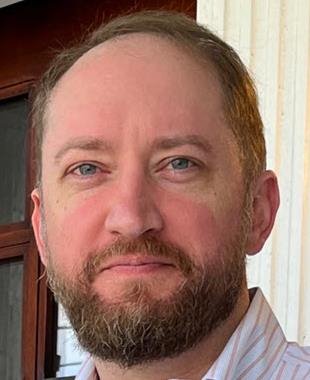Reducing Accents to Land Jobs
Reducing Accents to Land Jobs


Katerina Belik ran Rice University's Intense Oral Communication Program. Photo: George R. Brown School of Engineering
Graduate students in the United States who are non-native English speakers can have a distinct disadvantage. They’re often placed in internships after a few months of moving to the U.S. and can struggle to be understood, said Tracy Volz, the director of the ACTIVATE Engineering Communications Program at Rice University in Houston.
Last fall, Katerina Belik—at Volz’s request—launched a pilot program for engineering doctoral students who wanted immediate improvement in their spoken English.
Volz noted that Rice, like other research institutions, has many international graduate students in the school of engineering. Postgraduate students new to the U.S. are in programs of up to two years and are looking for internships right away.
Become a Member: How to Join ASME
“We want them to be successful in landing good internships, so thought we could help them by launching intensive oral communication program to improve skills and confidence with English,” she said.
Last year, Rice offered its first Intensive Oral Communication Program (IOCP) with an accent reduction component for engineering students. The eight-week trial for 30 students consisted of group lectures, individualized software-based training, and weekly one-on-one coaching. The IOCP proved so popular that the spring enrollment for the program had a waiting list, Volz said.
Belik ran the initial program, though she has since left the university to found Vedera, which specializes in wellness solutions for schools and businesses. Volz is seeking a replacement and administering the program.
Sessions included correcting articulation, adjusting duration of sounds, and explaining the intensity of airflow. Muscles of speech organs work according ot habits established in using a person’s native language or learned habits from a second language.
The IOCP 10-week program is run in cohorts of about 30 students. Administrators first assess the students’ English language speaking skills on “a couple of different dimensions” and then assign them into a track. Track one: was on the capability to vocalize sounds in English, “particularly vowel sounds and combinations like th,” Volz said.
More for You: Tips on Presenting Your Work to an Audience
In the second track, students work on intonation. The third track focuses on emphasizing words within speech, she added. There, they are better able to make sounds with a sense of intonation tied to North American English.
The program provides a license to software that includes self-guided instruction so students can practice on a regular basis. The software includes a dashboard feature through which students can monitor their progress and instructors can see where students are making progress and which skills they need to work on. Students also have regular meetings with an instructor to work on conversational skills, Volz said.
The Rice program is focused on making students with strong accents understood in the workplace. But those with strong accents can face accent-related stereotyping and discrimination, said Vikas Grover, assistant professor of speech-language pathology at New York Medical College.
He provides weekly “expanding English accent skills” for multi-lingual speakers in Westchester, N.Y., including many international students. He emphasizes the importance of not casting their accents negatively, but more as expanding their English accent skills.
Jean Thilmany is a science and technology writer in Saint Paul, Minn.
Last fall, Katerina Belik—at Volz’s request—launched a pilot program for engineering doctoral students who wanted immediate improvement in their spoken English.
Volz noted that Rice, like other research institutions, has many international graduate students in the school of engineering. Postgraduate students new to the U.S. are in programs of up to two years and are looking for internships right away.
Become a Member: How to Join ASME
“We want them to be successful in landing good internships, so thought we could help them by launching intensive oral communication program to improve skills and confidence with English,” she said.
Last year, Rice offered its first Intensive Oral Communication Program (IOCP) with an accent reduction component for engineering students. The eight-week trial for 30 students consisted of group lectures, individualized software-based training, and weekly one-on-one coaching. The IOCP proved so popular that the spring enrollment for the program had a waiting list, Volz said.
Belik ran the initial program, though she has since left the university to found Vedera, which specializes in wellness solutions for schools and businesses. Volz is seeking a replacement and administering the program.
Sessions included correcting articulation, adjusting duration of sounds, and explaining the intensity of airflow. Muscles of speech organs work according ot habits established in using a person’s native language or learned habits from a second language.
The IOCP 10-week program is run in cohorts of about 30 students. Administrators first assess the students’ English language speaking skills on “a couple of different dimensions” and then assign them into a track. Track one: was on the capability to vocalize sounds in English, “particularly vowel sounds and combinations like th,” Volz said.
More for You: Tips on Presenting Your Work to an Audience
In the second track, students work on intonation. The third track focuses on emphasizing words within speech, she added. There, they are better able to make sounds with a sense of intonation tied to North American English.
The program provides a license to software that includes self-guided instruction so students can practice on a regular basis. The software includes a dashboard feature through which students can monitor their progress and instructors can see where students are making progress and which skills they need to work on. Students also have regular meetings with an instructor to work on conversational skills, Volz said.
The Rice program is focused on making students with strong accents understood in the workplace. But those with strong accents can face accent-related stereotyping and discrimination, said Vikas Grover, assistant professor of speech-language pathology at New York Medical College.
He provides weekly “expanding English accent skills” for multi-lingual speakers in Westchester, N.Y., including many international students. He emphasizes the importance of not casting their accents negatively, but more as expanding their English accent skills.
Jean Thilmany is a science and technology writer in Saint Paul, Minn.









